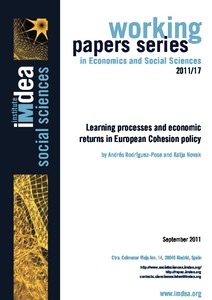Learning processes and economic returns in European cohesion policy
"This paper evaluates whether the learning mechanisms of the European Cohesion policy have contributed to improve the economic impact of Structural Fund expenditure over time. It intends to show whether the evolution of the policy in response to greater internal monitoring and consultation and...
| Main Authors: | , |
|---|---|
| Institution: | ETUI-European Trade Union Institute |
| Format: | TEXT |
| Language: | English |
| Published: |
Madrid
2011
IMDEA |
| Subjects: | |
| Online Access: | https://www.labourline.org/KENTIKA-19136582124919547649-Learning-processes-and-economi.htm |
| Summary: | "This paper evaluates whether the learning mechanisms of the European Cohesion policy have contributed to improve the economic impact of Structural Fund expenditure over time. It intends to show whether the evolution of the policy in response to greater internal monitoring and consultation and external scrutiny and criticism has resulted in a more efficient and better targeted Cohesion policy. This is tested using an econometric model which evaluates the effect of Structural Fund expenditure on the growth of regional GDP per capita – conditional on factor endowments, institutional quality and initial conditions – during the last programming periods for which full sets of data are available (1994-1999 and 2000-2006). The results of the analysis unveil an increase in the effectiveness of the policy in successive periods. This positive association is robust to controlling for the level of development of the country and the relative economic position of a region within a country. The results also show that, when structural factors are taken into consideration, Structural Fund investment tends to yield higher returns in better-off countries and wealthier regions within countries." |
|---|---|
| Physical Description: | 40 p. Digital |

